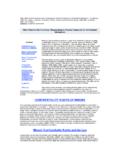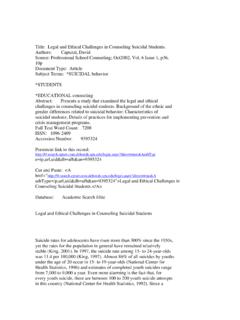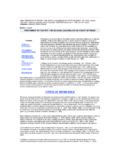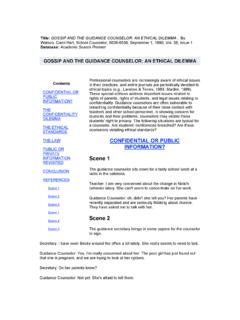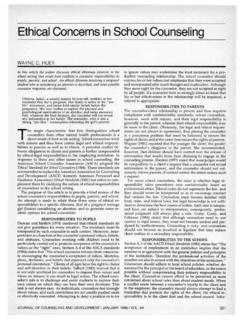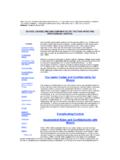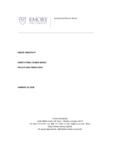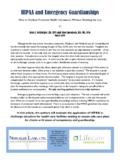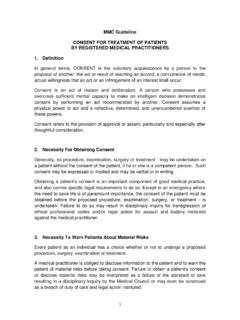Transcription of CONFIDENTIALITY AND THE LAW - Connection
1 Record: 1 Title: CONFIDENTIALITY and the Law. Authors: Sealander, Karen A. Source: Professional School Counseling; Dec99, Vol. 3 Issue 2, p122, 6p Document Type: Article Subject Terms: *STUDENT records -- Law & legislation *SCHOOLS -- Records & correspondence *STUDENT counselors Geographic Terms: UNITED States NAICS/Industry Codes611 Educational Services Abstract: Presents the laws governing the CONFIDENTIALITY of student information in the United States. Provisions for the accessibility and disclosure of student records; Rules for the privacy of student participation in surveys; Protection of drug and alcohol treatment records of students; Implication of the laws for school counselors. Full Text Word Count: 4206 ISSN: 1096-2409 Accession Number: 3884446 Database: Academic Search Elite Notes: Check SPU Library Catalog for Holdings. CONFIDENTIALITY AND THE LAW In an increasingly complex society, parents have concerns that personal information about their children in school records is accurate and that access is restricted to those individuals with a justifiable purpose for their use of that information.
2 At the same time, teachers, counselors, and school administrators must be aware of the rights afforded students and their parents regarding school records. Hence, the notions of CONFIDENTIALITY in the schools and protection of student privacy have recently received much attention. The aim of this paper is to introduce readers to the laws that govern and protect students, teachers, and school counselors, and the issues surrounding CONFIDENTIALITY in the schools. The laws safeguarding the CONFIDENTIALITY of student information are established in four main congressional acts. The Family Educational Rights and Privacy Act (FERPA, 1974), also known as the Buckley Amendment, is the major legislation that sets parameters on accessibility and disclosure of student records. The Grassley Amendment (1994) to the Goals 2000: Educate America Act of 1994 details privacy of student participation in surveys, analysis, and evaluation. Drug and alcohol treatment records of students kept by any institution receiving federal assistance are protected under Drug Abuse Office and Treatment Act (1976).
3 Records of students in special education are affected by the above laws plus the Individuals with Disabilities Education Act (IDEA, 1997). These four acts provide a structure for laws concerning CONFIDENTIALITY and its application as a safeguard for students and professionals. These laws specify certain requirements and obligations of participating agencies, including local educational agencies (LEA), in the control and disbursement of records, and provide parents and students rights to access these records. The four acts will be discussed in the sections that follow along with their implications for school counselors. FERPA The Family Educational Rights and Privacy Act of 1974, also known as the Buckley Amendment, is a four-part act that gives parents and students who have reached the age of majority the right to review and inspect school records. Part one of the Buckley Amendment states that school districts receiving federal funds must comply with FERPA or risk losing their funding.
4 Part two states that schools must receive parental consent before evaluating or admitting students in school programs that would change their values or behavior. Part three addresses federal funding and denies such funds to schools that do not restrict unauthorized access to student information and protect the privacy of their records. Finally, part four protects children who are being used to gather data for federal surveys (FERPA, 1974). FERPA applies to all educational records that are defined as any personally identifiable record collected, maintained, or used by a school that the student has attended. Personal logs, treatment records, and directory information, however, are exceptions to the above act. The above mentioned are excluded for the following reasons: Personal logs are records of instructional, supervisory, administrative, and associated educational personnel that are the sole possession of the individual and have not been shared with any other peer or professional.
5 Treatment records are records of a physician, psychiatrist, psychologist, or other recognized professional acting in his or her role as a professional and used only in Connection with the treatment of the student. Directory information are records that include the student's demographic information, grade or field of study, participation in extracurricular activities, physical descriptions, and dates of attendance (FERPA, 1974; Underwood & Mead, 1995). School records may not be released without the consent of the parents and written consent must be obtained for special education students. Schools must inform the parents before a disclosure of student information. (See table, consent Exceptions.) Additionally, Parents have the right to challenge the information contained in the records if they believe it to be inaccurate or misleading. The school must provide an opportunity for a hearing if they disagree or refuse to alter the record. Amendments to the FERPA regulations (1974) were made in response to the passage of the Improving America's School Act (1994).
6 The following is a summary of these changes. First, the new changes give educational agencies greater flexibility by removing a previous regulatory provision requiring schools to adopt a formal, written, student-records policy. Instead, the school may include additional information in the annual notification of rights. A model notification is included in the appendix of the regulations. Second, state educational agencies must afford parents and eligible students access to education records that they maintain. Third, the amendments clarify that an educational agency or institution initiating legal action against a parent or eligible student must make a reasonable effort to notify, in advance, the parent or student of its intent to disclose the information from education records to a court of law. Fourth, FERPA was amended so that a school is not required to notify a parent or eligible student before complying with certain subpoenas if the court has ordered notification not be made.
7 Fifth, FERPA was amended to allow disclosures of education records, without prior consent , to certain state and local officials, pursuant to a State statute that allows the disclosure in Connection with a juvenile justice system. Sixth, the amendments clarify that an educational agency may include information in a student's education records concerning disciplinary action taken against a student for conduct that posed a significant risk to that student or other members of the school community. Seventh, in Connection with the previous amendment, clarification was made that an educational agency may disclose information without prior consent to those who have legitimate educational interests in the behavior of the student. Eighth, if a third party discloses information in violation of FERPA, that agency is prohibited from accessing education records for a period of not less than 5 years. Finally, the amendments clarify that a person filling a complaint under FERPA must have legal standing, that is must be a parent of an eligible student affected by the violation (AACRAO Government Relations, 1999).
8 Grassley Amendment The Grassley Amendment (1994) replaced and modified the Hatch Amendment to the General Education Provisions Act. The Hatch Amendment speaks to the protection of pupil rights in conjunction with any survey, analysis, or evaluation of any applicable program within the school setting. This amendment applies to all programs where federal money is involved in the implementation or maintenance of the program. The Grassley Amendment expanded language to cover ail surveys, analysis, or evaluation projects. It also grants individuals the right to inspect materials ( manuals, tapes, films) used in Connection with any survey, analysis, or evaluation. Written consent of parents or eligible students by school districts must be secured for the above activities before information is collected that reveals: Political affiliations Mental or psychological problems Sexual behavior or attitudes Illegal, anti-social, self-incriminating, and demeaning behavior Critical appraisals of other individuals with whom the students have a close family relationship Legally recognized privileged or analogous relationships, such as those of physicians, lawyers, or ministers Income, except for that information required to determine eligibility for financial assistance The statute does not apply to information gathering that is entirely voluntary.
9 Difficulties exist as a result of the Grassley Amendment (FERPA, 1974). First, although it requires written consent from parents, the words informed consent do not appear in the law. This may create difficulties as parents may give consent without being truly informed and thus fully understanding the consent they are providing to the school or researcher. Additionally, on June 6, 1991, the Department of Education revised federal regulations concerning research with human beings, experimental procedures used in public schools to develop new instructional methods. Curricula or classroom management techniques are now exempt from the regulations. No institutional review board (IRB) review is necessary for experiments in public schools and therefore, no protections gained from IRB review are afforded to students. No explanation of potential risks is necessary. No permission is necessary. Protection has been essentially stripped away from children. children can legally be forced to take part in experiments to develop new instructional methods and curricula (psychological and otherwise) despite the objections of their parents.
10 New ideas can legally be tested in individual public school classrooms with no accountability if something goes wrong. The revised regulations appear in the Federal Register, volume 56, Section 117, dated June 18, 1991, on page 28012. Drug Abuse Office and Treatment Act CONFIDENTIALITY of records of persons receiving drug or alcohol abuse treatment are protected under federal law (Drug Abuse Office and Treatment Act, 1976). This statute applies to any program assisted in any way by the federal government. These requirements apply to all records relating to the identity, diagnosis, prognosis, or treatment of any student involved in any federally assisted substance abuse program. All records must be maintained in a locked and secure area. Since these regulations are generally more strict, they should be maintained separately from other educational records. Records, generally, may not be disclosed without written consent of the student. Under applicable state law, minor clients with legal capacity must give consent for any release of information, including to the minor's parents.
